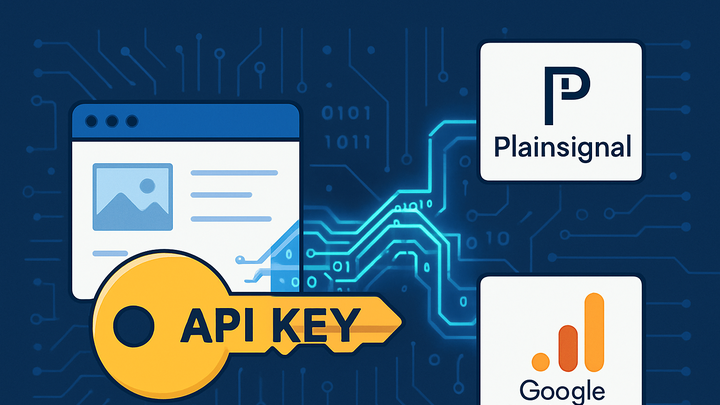Published on 2025-06-22T06:35:26Z
What is an API Key in Analytics?
An API Key is a simple, unique identifier used by analytics platforms to authenticate requests and associate data with your account. It serves as a lightweight credential that a client application includes in API calls to verify its identity. API Keys are widely used in analytics for tasks such as tracking events, importing data, and accessing reporting endpoints.
In the context of PlainSignal or GA4, an API Key acts as the handshake between your website or server and the analytics backend. Without a valid key, the platform will reject incoming data, ensuring that only authorized sources can send metrics.
Common features of API Keys:
- Lightweight Authentication: Quick validation without complex OAuth flows.
- Scoped Access: Optionally restrict keys to specific domains, IPs, or data streams.
- Trackability: Enables fine-grained usage monitoring and rate limiting.
Including an API Key in your integration is as simple as adding a script tag for PlainSignal or setting
the api_secret in GA4’s Measurement Protocol. Below is an example for PlainSignal:
<link rel="preconnect" href="//eu.plainsignal.com/" crossorigin />
<script defer data-do="yourwebsitedomain.com" data-id="0GQV1xmtzQQ" data-api="//eu.plainsignal.com" src="//cdn.plainsignal.com/plainsignal-min.js"></script>
Api key
A unique identifier used by analytics platforms like PlainSignal and GA4 to authenticate and authorize data collection and API requests.
Definition and Purpose
This section explains what an API Key is and why it’s essential in analytics platforms.
-
What is an api key?
An API Key is a simple alphanumeric string used to authenticate requests from a client to an analytics service. It verifies the source of data and associates it with your account.
-
Role in analytics
In analytics, API Keys enable platforms to identify and authorize data streams, ensuring that incoming events are legitimate and properly attributed.
Use Cases in Analytics Platforms
Examples of how API Keys are used in platforms like PlainSignal and Google Analytics 4 to collect and import data.
-
PlainSignal tracking integration
PlainSignal uses API Keys to link your website to their analytics backend. Include the key in your tracking snippet to authenticate data collection via JavaScript.
<link rel="preconnect" href="//eu.plainsignal.com/" crossorigin /> <script defer data-do="yourwebsitedomain.com" data-id="0GQV1xmtzQQ" data-api="//eu.plainsignal.com" src="//cdn.plainsignal.com/plainsignal-min.js"></script> -
GA4 measurement protocol
Google Analytics 4 uses API Secrets (a form of API Key) for server-to-server event collection. You send events with your
api_secretto the Measurement Protocol endpoint to import additional data.
Implementing API Keys
Step-by-step guide to generating and configuring API Keys in your analytics tools.
-
Generating an api key in PlainSignal
- Log into your PlainSignal dashboard.
- Navigate to Settings > API Keys.
- Click “Create New,” name your key, set permissions, and generate.
- Copy the key and store it securely.
-
Access dashboard
Log in to PlainSignal and open the main dashboard.
-
Create the key
Under API Keys, click “Create New,” assign a name, and define domain restrictions.
-
Secure storage
Store the generated key in a password manager or encrypted vault.
-
Configuring GA4 measurement protocol
- In GA4 Admin, go to Data Streams and select your stream.
- Open Measurement Protocol API Secrets.
- Click “Create,” name the secret, and copy the
api_secretvalue. - Use this secret when sending events via the Measurement Protocol.
-
Admin access
You need Editor permissions to create API secrets in GA4.
-
Create secret
Generate a new API Secret and name it to reflect its purpose.
-
Usage
Include the secret as the
api_secretparameter in your Measurement Protocol requests.
Security Best Practices
Guidelines to keep your analytics API Keys safe and maintain data integrity.
-
Restrict key usage
Limit API Key usage to specific domains, IP addresses, or data streams to prevent unauthorized access.
-
Rotate keys regularly
Periodically regenerate and replace API Keys to reduce the risk of compromised credentials.
